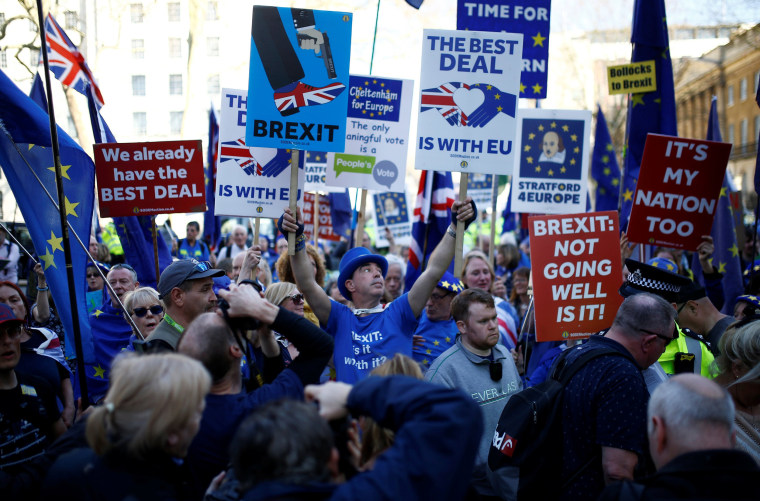By: Michael Pappas

On June 23rd, 2016, 51.9% of voters in the United Kingdom voted to leave the European Union, and Tory Prime Minister Theresa May officially triggered Article 50 on March 28th, 2017, eight months later. Article 50 is the legal mechanism by which a European Union member may leave and, once triggered, a transition deal must be agreed upon within two years. That deadline is now less than three weeks away on March 29th. If the UK requests it, then an extension of this deadline can be granted by a unanimous vote of the European Council. However, if a deal is not agreed to by the deadline and an extension is not sought or granted, then a “No-Deal” Brexit will occur whereby the UK is immediately out of the EU on March 30th without a transition period, guided by WTO trade rules and subject to EU import regulations for non-members.
Late last year a transition deal was agreed to between the EU and the British government, but when put to a vote in the House of Commons in January, the deal was defeated by the largest margin of any vote in the modern history of British Parliament (202-432). One of the biggest sticking points opponents have with May’s deal is the ‘Irish backstop’, whereby the UK will remain in a customs union with the EU indefinitely to prevent a physical border from being constructed between Northern Ireland and the Republic of Ireland. Opponents are either completely against the backstop or believe that there needs to be a deadline for it so that the country is not indefinitely linked to the EU even after leaving. The problem necessitating the backstop stems from the 1998 Good Friday Agreements that ended the three-decade-long Troubles in Northern Ireland, part of which phased out all border checkpoints between the two governments on the island. Were a physical border to return, some believe violence would return to the region, and some a united Ireland.
Despite previous statements, May’s speech in the House of Commons February 26 indicated a shift in the government’s policy by expanding the number of possible paths beyond simply the previously negotiated deal and “No-Deal.” May laid out and promised a scheduled order of votes, whereby her previous deal would be voted on again on March 12. In the seemingly likely case that it fails, then a vote will be held on March 13 on whether the Parliament would allow a “No-Deal” on March 29. If this vote fails as well, then a vote will be held on March 14 on whether to “seek a short, limited extension to Article 50.” This shift came on the heels of reports that government ministers would rebel against May to prevent the possibility of a “No-Deal” Brexit, led by Business Secretary Greg Clark, Justice Secretary David Gauke, and Work and Pensions Secretary Amber Rudd, as well as the pressure of resignations by a dozen MPs between the governing Conservative Party and opposition Labour Party last month. Labour leader Jeremy Corbyn, after Labour’s alternative Brexit plan was also rejected by the House on February 27 and, despite appearing reluctant do so in the past, said the party fully backs a second referendum. One amendment put forward with the support of Labour leadership would, if passed, see Labour abstain from the second ‘meaningful vote’ on May’s Brexit deal if a second referendum is held on those terms.
Opponents argue that the possible repercussions of a “No-Deal” Brexit are numerous. Most largely surround the dearth of regulations that British exporters to the EU will need to comply with quite literally overnight. This includes British food producers, whose products, the EU has said, may take up to six months to approve for importation. This likely leaves a large sector, such as that of sheep, with four and a half million lambs with no market, necessitating either a large-scale culling or payments to farmers by the government to prevent such a drastic measure. Another major, yet seemingly innocuous, effect of such a Brexit is the serious lack of EU-compliant pallets for shipping. This owes to the fact that as a member, the UK currently benefits from lower regulatory standards for pallet decontamination, but overnight the nation would be subject to the much stricter rules for Eu non-member states.
A government report released last Tuesday further summarized some of the largest impacts of a “No-Deal” Brexit, indicating that the UK economy will be 6 to 9% smaller in the next 15 years than it otherwise would have been, food prices are likely to increase, large tariffs for exports to the EU will likely be imposed, and only 6 of 40 planned trade deals have been signed. These are just a few examples that demonstrate the type of fallout that could result from a “No-Deal” should the March 29 deadline come without an extension or alternative plan. It is unclear how soon a solution to the current impasse will be found and how the next month and on will play out, but Goldman Sachs revised their Brexit odds after May’s vote schedule announcement at 55% for an Article 50 extension, 35% for no Brexit, and 10% for a “No-Deal” Brexit. Come March 30, the world will know whether the United Kingdom has crashed out of the EU, kicked the can down the road, or planned a second referendum.
